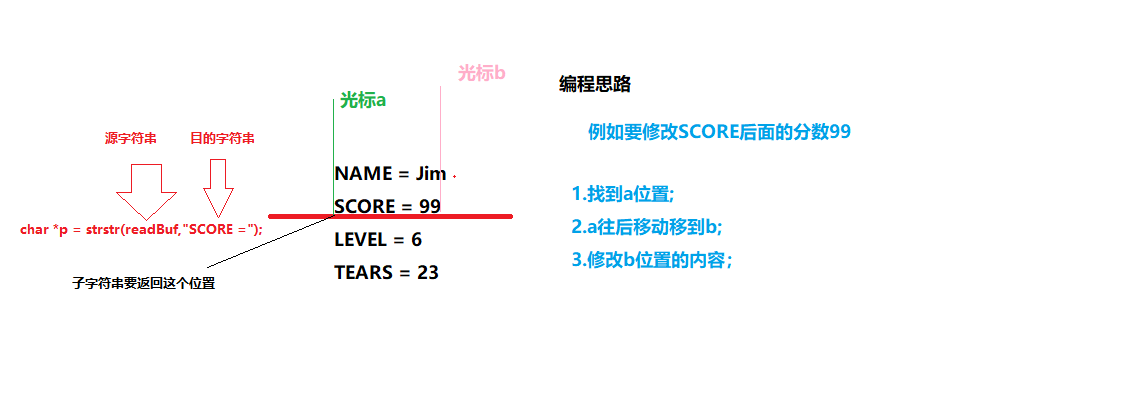Document programming summary III
Project Name: configuration file of Linux file I/O modifier
Objective: to further exercise the use of linux file I/O programming basic functions: open, read, write, close, lseek;
Before the project starts, we will introduce the string STR function under Linux C
Function function: find the first occurrence of needle from the string haystack, but the function does not compare the NULL terminator.
Return Description: returns a pointer to the first needle position, or NULL if it is not found.
SYNOPSIS
#include <string.h>
char *strstr(const char *haystack, const char *needle);//Parameter Description: haystack is a pointer to a source string and needle is a pointer to a destination string.
#define _GNU_SOURCE /* See feature_test_macros(7) */
#include <string.h>
char *strcasestr(const char *haystack, const char *needle);
/*
DESCRIPTION
The strstr() function finds the first occurrence of the substring nee‐
dle in the string haystack. The terminating null bytes ('\0') are not
compared.
The strcasestr() function is like strstr(), but ignores the case of
both arguments.
RETURN VALUE
These functions return a pointer to the beginning of the substring, or
NULL if the substring is not found.
*/Programming diagram of this function:

Preliminary implementation of the code:
#include <sys/types.h>
#include <sys/stat.h>
#include <fcntl.h>
#include <unistd.h>
#include <stdio.h>
#include <stdlib.h>
#include <string.h>
int main(int argc , char *argv[])
{
int fd;
char *readBuf = NULL;
if(argc != 2){
printf("param error!\n");
exit(-1);
}
fd = open(argv[1],O_RDWR);
int size = lseek(fd,0,SEEK_END);
lseek(fd,0,SEEK_SET);
readBuf = (char *)malloc(sizeof(char)*size + 8);
int n_read = read(fd,readBuf,size);
char *p = strstr(readBuf,"SCORE = ");
if(p == NULL){
printf("not found!\n");
exit(-1);
}
p = p +strlen("SCORE = ");
*p = '1';
int n_write = write(fd,readBuf,strlen(readBuf));
close(fd);
return 0;
}
~
~
~
~ The result of the above code can't cover the original code but start another line. How to solve it?
There are two solutions: one is to move the cursor to the head and write again
Scheme 2: use TRUNC to delete the original content
Now use solution one
Code optimization:
#include <sys/types.h>
#include <sys/stat.h>
#include <fcntl.h>
#include <unistd.h>
#include <stdio.h>
#include <stdlib.h>
#include <string.h>
int main(int argc , char *argv[])
{
int fd;
char *readBuf = NULL;
if(argc != 2){
printf("param error!\n");
exit(-1);
}
fd = open(argv[1],O_RDWR);
int size = lseek(fd,0,SEEK_END);
lseek(fd,0,SEEK_SET);
readBuf = (char *)malloc(sizeof(char)*size + 8);
int n_read = read(fd,readBuf,size);
char *p = strstr(readBuf,"SCORE = ");
if(p == NULL){
printf("not found!\n");
exit(-1);
}
p = p +strlen("SCORE = ");
*p = '1';
lseek(fd,0,SEEK_SET);
int n_write = write(fd,readBuf,strlen(readBuf));
close(fd);
return 0;
}
Note: Please add the file name after the execution file. / a.out. For example, the file name is TEXT.config for running. / a.out TEXT.config